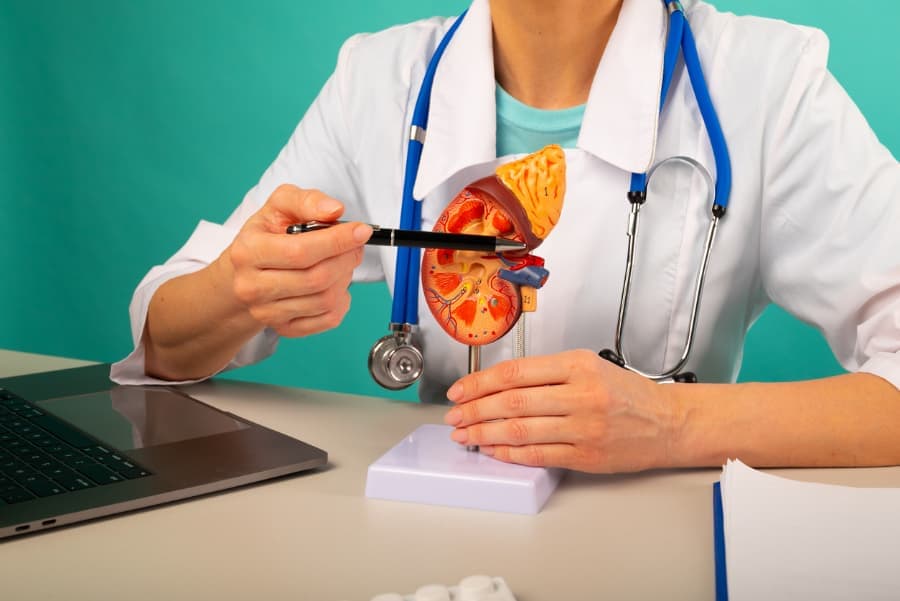Treatment for Kidney Stones in Staten Island, NY
Kidney stones are a painful condition that develops because of minerals and salts that build up in the kidneys. Although kidney stones often pass on their own, treatment options are available for more severe cases. Discover treatment options from the urology and nephrology team at Richmond University Medical Center on Staten Island, NY.

What Are Kidney Stones?
Kidney stones (also called renal calculi, nephrolithiasis, or urolithiasis) are hard deposits that form inside the kidneys. They are made of minerals and salts, and they form when urine becomes concentrated. This allows these minerals to crystallize, causing them to stick together. They may start small but grow larger. Their impact can be felt throughout the urinary tract, causing discomfort or pain anywhere from the kidneys to the bladder, until they are ultimately passed. This process can be quite painful but generally leaves no lasting negative impact on a patient’s health.
Signs and Symptoms
Kidney stones may form and exist without a patient knowing. It is only when the stone begins to move around in the kidney or moves into one of the ureters that they recognize some discomfort. If a kidney stone gets stuck in the ureter, the kidney will begin to swell as the flow of urine to the bladder is blocked, causing pain. There are many different kidney stone symptoms, including:
- Sharp pain in the side or lower back
- Pain in the lower abdomen and groin
- Pain or burning during urination
- Waves of pain that increase and decrease in intensity
- Pink, brown, or red urine
- Cloudy urine
- Odorous urine
- The sensation that one needs to urinate frequently
- Urinating more frequently than usual
- Small amounts of urine
- Nausea or vomiting
Patients may even experience a fever or chills if there is an infection. If patients experience any of the signs of kidney stones, they should reach out to a physician and get it checked. This helps ensure kidney stones do not become a bigger issue.
What Causes Kidney Stones?
Kidney stones have several potential causes. If a patient or a family member has previously had kidney stones, there may be a higher risk. Those who have diets high in protein, salt, and sugar or are obese may be more likely to suffer from kidney stones. Certain digestive surgeries and diseases may increase a patient’s risk as well. A patient may also be at risk if they live in a warm, dry climate or do not drink enough water.
There are different types of kidney stones, including:
Calcium Stones
Calcium stones are the most common. They generally form from calcium oxalate, which is made in the liver every day. The amount is dependent on diet, with some fruits and vegetables having a high concentration. These stones may also form from calcium phosphate, which is linked to certain medications and metabolic conditions.
Uric Acid Stones
Uric acid stones form when the body has lost too much fluid. This can be because of malabsorption, diabetes, metabolic syndrome, chronic diarrhea, or genetics.
Struvite Stones
Struvite stones are formed because of an infection in the urinary tract. They grow large and rapidly, often showing few symptoms.
Cystine Stones
Cystine stones are only formed in those with cystinuria, a hereditary disorder that causes the kidneys to excrete a certain amino acid more than they should.
Treatment for Kidney Stones
While kidney stones may be painful, they often pass on their own. Patients may simply need to drink more water and have pain relievers on hand. A physician may also prescribe alpha-blockers to help relax the muscles in the ureter, making the stone easier to pass. Larger kidney stones may take up to three weeks to pass on their own. Once a patient has passed a kidney stone, they should try to save it to bring to their physician. This will help determine the cause and help prevent kidney stones in the future.
If a stone is too large to pass, a physician may use sound waves to break it up in a procedure called shock wave lithotripsy (SWL). A physician may opt for a ureteroscopy (URS). This process involves moving a small telescope through the bladder and into the ureter to view, break up, and remove the stone from the inside.
If the stone is too large or the other options are not successful, a surgery called a Percutaneous Lithotripsy (PCNL) may be performed. This procedure involves making a small incision in the back or side, allowing a small telescope and instruments inside to access the kidneys.
Seek Care for Kidney Stones Today
While kidney stones can seem frightening, when patients recognize the signs and symptoms and talk with their physicians early on, they can prevent this common condition from becoming a more significant problem.
The team at Richmond University Medical Center on Staten Island, NY, provides patients with extensive knowledge, the latest medical advancements, and comprehensive care. Care is available through Richmond University Medical Center’s Urology Services Center. For patients with kidney stones and seeking relief, search for a physician or contact the Urology Services Center, located at 1200 South Avenue, Staten Island, NY 10314, at 718-370-1400.



